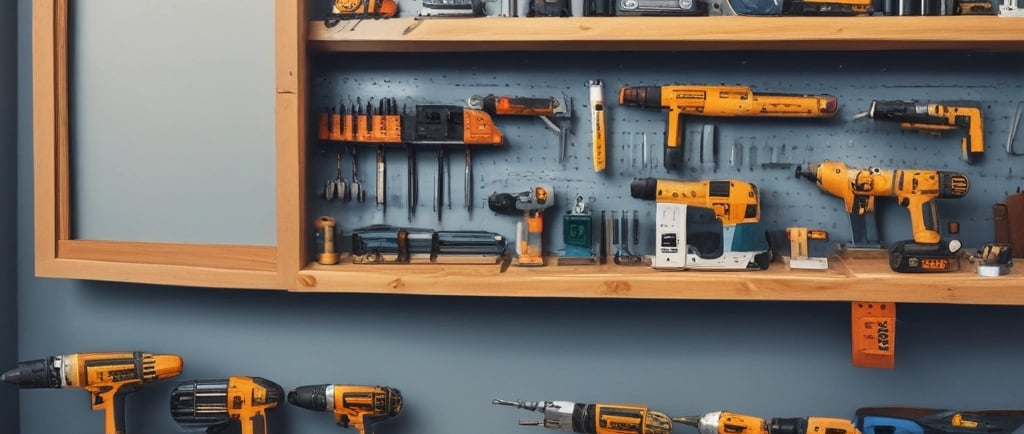The Evolution of Festool Power Tools
FESTOOL GENERAL
10/13/20255 min read


The Origins of Festool: A Journey Through Time
Festool, a name synonymous with high-quality power tools, has its roots deeply embedded in the innovative landscape of early 20th century Germany. Founded in 1925 by Wilhelm Fest, the company initially operated as a small manufacturing entity. It primarily focused on producing high-quality wooden tools, a commitment that established the foundation for Festool's future success. At a time when the majority of tools were still manually operated, the company began to experiment with electric technology, setting it on a transformative path toward modernity.
In the years leading up to World War II, the pre-electric tool industry was characterized by tools that relied heavily on human power. This absence of electric options posed significant limitations for craftsmen and industries alike. Wilhelm Fest recognized this gap and embarked on an ambitious journey to develop tools that seamlessly blended craftsmanship and innovative technology. His philosophy revolved around the idea that power tools should enhance the effectiveness and precision of traditional hand tools, not replace them. This conceptual framework became the cornerstone of Festool's identity.
The introduction of Festool's first electric tools met with a mixed reception. While there was immediate interest in the novel technologies, many potential customers were cautious about transitioning from their reliable manual tools to the new electric alternatives. Overcoming such skepticism required not just superior product design, but also significant efforts in demonstrating the advantages of these electric options. The early years of Festool were marked by challenges, yet they were pivotal in shaping a legacy focused on quality and craftsmanship.
The founding philosophy of “the perfect combination of craftsmanship and technology” has continued to resonate and define the brand ethos over the decades. As the company evolved, it remained steadfast in its commitment to innovation, consistently pushing the boundaries of what is possible in power tool manufacturing. This journey illustrates the resilience and foresight of Wilhelm Fest and the foundation he laid for a company that has had a lasting impact on the power tool industry.
Key Innovations and Milestones in Festool's History
Festool, a renowned name in the power tool industry, has undergone significant evolution since its inception, driven largely by a commitment to innovation and customer satisfaction. One of the landmark moments in Festool's history was the introduction of the first portable circular saw in the 1960s. This innovation marked a pivotal point in woodworking, as it allowed professionals to perform precise cuts with increased convenience, addressing the growing need for portability and efficiency in job sites.
Another vital milestone for Festool came with the advancement of dust extraction systems. As awareness of workplace health hazards increased, Festool recognized the pressing need for effective dust management. The launch of their integrated dust extraction units revolutionized the way professionals approached sanding and cutting tasks. By creating a system that not only improved air quality but also enhanced tool performance, Festool set new industry standards that others soon followed.
Furthermore, the development of the modular tool system has greatly contributed to Festool's success. This innovative approach allows professionals to customize their tool selection according to specific projects, making it possible to adapt to different tasks without needing a vast array of equipment. This system not only saves space but also enhances productivity by providing the correct tools at hand, reflecting a deep understanding of user needs and preferences.
Particularly noteworthy is the evolution of Festool's sanding and sawing systems. The introduction of the Rotex sander and TS track saw exemplifies their focus on precision and versatility. User feedback has consistently driven these enhancements, demonstrating Festool's commitment to continuous improvement and innovation in offering power tools that make the work of professionals not only easier but also more efficient.
Festool's Commitment to Quality and Sustainability
Festool has long established itself as a leader in the power tool industry, primarily due to its unwavering commitment to quality craftsmanship. The company recognizes that the longevity and efficiency of its tools are paramount not only for performance but also for customer satisfaction. Each Festool tool undergoes a rigorous testing and evaluation process designed to ensure that it meets stringent standards of durability and effectiveness. This meticulous approach to manufacturing reflects a dedication to excellence that has become synonymous with the Festool brand.
Alongside quality, Festool prioritizes sustainability in its operations. The process begins with the principled sourcing of materials, emphasizing responsibility and environmental stewardship. By choosing suppliers who adhere to ethical practices, Festool aligns itself with broader sustainability goals and contributes to the preservation of natural resources. This commitment extends into the manufacturing phase, where energy-efficient production techniques are implemented to minimize waste and reduce the environmental footprint. Such practices not only enhance the sustainability of their products but also ensure that customers are investing in tools that embody eco-friendliness.
Moreover, customer testimonials often highlight the long-term value associated with investing in Festool products. Users frequently share experiences of how the durability of these tools translates into consistent performance over time, reducing the need for frequent replacements. This focus on quality coupled with sustainable practices means that customers can rely on their Festool power tools not just in the short term, but throughout their professional lives. Thus, the blend of craftsmanship, sustainability, and customer satisfaction creates a compelling narrative that places Festool at the forefront of the power tool industry.
The Future of Festool: Trends and Innovations Ahead
As we look towards the future, Festool power tools are poised to embrace a multitude of industry trends and innovations that will redefine the standards of performance and user experience. One significant trend is the integration of smart technology within power tools. Increasingly, manufacturers are incorporating features such as Bluetooth connectivity, allowing users to operate tools with mobile applications, thereby enhancing productivity through data-driven insights and real-time diagnostics.
Furthermore, advancements in battery-powered tools are on the horizon. The pursuit of lightweight, long-lasting batteries that support high performance is gaining traction. Festool's ongoing commitment to developing high-efficiency battery systems ensures that their tools not only provide extended run times but also charge rapidly, meeting the demands of professionals on job sites where time is of the essence.
User-oriented design is another crucial area of focus for Festool’s future projects. With the intent to create tools that cater to the needs of various professionals, Festool is utilizing user feedback to innovate ergonomic designs that enhance comfort and reduce fatigue during extended use. This emphasis on user experience aligns with the broader industry movement towards creating tools that prioritize the professional’s well-being and efficiency.
Moreover, the digitalization of production processes is transforming how power tools are developed. Technologies such as 3D printing are enabling manufacturers to create prototype components rapidly, ultimately allowing for quicker iterations and refinements in tool design. This approach not only accelerates the innovation cycle but also facilitates customization options, enabling professionals to tailor tools to their specific requirements.
Insights gathered from industry experts suggest that Festool remains dedicated to pushing boundaries in power tool innovation. With an eye on the future, the company is set to maintain its position as a leader by harnessing emerging technologies and evolving its product line to better serve its customers. The anticipated advancements in smart technology, battery efficiency, and user-centered design will undoubtedly reinforce Festool's legacy in the power tools market.
